By Chantal Bax · Friday, January 24, 2014 This is the second of three papers delivered at a seminar on religion and politics that was organized with Rowan Williams, the former archbishop of Canterbury, on the occasion of his recent book Faith in the Public Square. The seminar was held at Radboud University in December 2013. The first paper, by Martijn de Koning, appears here. The third paper, by Herman Westerink, will be posted here shortly.
According to the publisher of Faith in the Public Square, “Archbishop Rowan Williams is the most gifted Anglican priest of his generation. His views are consistent and orthodox and yet he has been consistently misunderstood.” Now maybe this is just another case of misunderstanding, but I doubt, not whether Rowan Williams is the most gifted priest of his generation, but whether his views are really that orthodox. In my understanding of that term—though I should stress that my vocabulary is not first and foremost theological—Faith in the Public Square is far from an orthodox book. It is unafraid to challenge received opinions, both religious and other kinds. This for instance shows itself in Williams’s consistent challenging of a dichotomy that has long shaped Western social and political thought, namely that of Gemeinschaft versus Gesellschaft, or of community versus society. What I am referring to is the idea that there is a sharp distinction between, on the one hand, traditional social bonds based on a robust shared identity resulting in organic solidarity—that would be Gemeinschaft—and on the other hand typically modern organizations of collective life in the form of negotiated interests and impersonal contracts—which would be Gesellschaft (and I’ll stick to the German terms because these bring out the contrast most clearly).
Continue reading →
By Christian Kronsted · Tuesday, August 13, 2013 As an occasional feature on TELOSscope, we highlight a past Telos article whose critical insights continue to illuminate our thinking and challenge our assumptions. Today, Christian Kronsted looks at Lowell A. Dunlap’s “Hume, James, and Husserl on the Self,” from Telos 2 (Fall 1968).
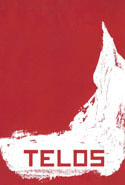 With the publication of A Treatise Of Human Nature, David Hume turned the philosophical community of his time upside down with his provocative skepticism and denial of a cohesive self. Since its initial publication, Hume’s claim that the self is nothing but a bundle of perceptions has plagued philosophers and psychologists alike, and has inspired many to completely abandon the idea of a coherent self. Yet a central question remains largely unanswered: if there is not a self, what is doing the thinking, and how is it done? If a person does not have a “self,” how come human beings think of themselves as unique and separate entities that have subjective experiences? Lowell A. Dunlap’s article “Hume, James, and Husserl on the Self” investigates how William James and Edmund Husserl tackled the notion of personal identity in the aftermath of Hume’s philosophy. With the publication of A Treatise Of Human Nature, David Hume turned the philosophical community of his time upside down with his provocative skepticism and denial of a cohesive self. Since its initial publication, Hume’s claim that the self is nothing but a bundle of perceptions has plagued philosophers and psychologists alike, and has inspired many to completely abandon the idea of a coherent self. Yet a central question remains largely unanswered: if there is not a self, what is doing the thinking, and how is it done? If a person does not have a “self,” how come human beings think of themselves as unique and separate entities that have subjective experiences? Lowell A. Dunlap’s article “Hume, James, and Husserl on the Self” investigates how William James and Edmund Husserl tackled the notion of personal identity in the aftermath of Hume’s philosophy.
Continue reading →
By Johanna K. Schenner · Tuesday, July 2, 2013 As an occasional feature on TELOSscope, we highlight a past Telos article whose critical insights continue to illuminate our thinking and challenge our assumptions. Today, Johanna Schenner looks at Federico Stame’s “The Crisis of the Left and New Social Identities,” from Telos 60 (Summer 1984).
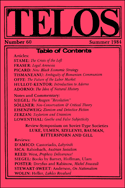 In “The Crisis of the Left and New Social Identities” (1984), Federico Stame addresses the problems encountered by left-wing ideologies and political parties, such as the banality of their demands, as well as deeper underlying issues, such as the falling away of the friend-foe nexus in politics. He also provides hope for improvement by invoking the leading role of new social identities in renewing the tradition of the political Left. In “The Crisis of the Left and New Social Identities” (1984), Federico Stame addresses the problems encountered by left-wing ideologies and political parties, such as the banality of their demands, as well as deeper underlying issues, such as the falling away of the friend-foe nexus in politics. He also provides hope for improvement by invoking the leading role of new social identities in renewing the tradition of the political Left.
Continue reading →
By Yonathan Listik · Tuesday, March 12, 2013
As an occasional feature on TELOSscope, we highlight a past Telos article whose critical insights continue to illuminate our thinking and challenge our assumptions. Today, Yonathan Listik looks at Jürgen Habermas’s “On Social Identity,” from Telos 19 (Spring 1974).
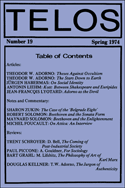 Jürgen Habermas’s objective in “On Social Identity” is clearly defending the usage of instrumental rationality toward the development of a universal morality. For Habermas, the new social identity should be constructed through universalistic moral systems, thereby eliminating possible frictions or incoherence present in modern society. The obsolescence of the state and its replacement by autonomous means of identity construction, such as art, already point to his emphasis on a more particular form of identity construction. Jürgen Habermas’s objective in “On Social Identity” is clearly defending the usage of instrumental rationality toward the development of a universal morality. For Habermas, the new social identity should be constructed through universalistic moral systems, thereby eliminating possible frictions or incoherence present in modern society. The obsolescence of the state and its replacement by autonomous means of identity construction, such as art, already point to his emphasis on a more particular form of identity construction.
Continue reading →
By Chantal Bax · Monday, January 14, 2013 The following paper was presented at Telos in Europe: The L’Aquila Conference, held on September 7-9, 2012, in L’Aquila, Italy.
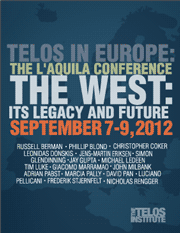 Should national identity be considered to be an outdated concept in this day and age? Have the adjectives “French,” “Italian,” “German,” and so on become meaningless terms over the last couple of decades? Both practical and theoretical developments may seem to suggest that this question should be answered in the affirmative. Processes of globalization, including increased mobility and migration, have made it unmistakably clear that the human world cannot be divided into discrete social units. In addition, much philosophical effort has been devoted to destabilizing notions like “community,” “sameness,” and “identity.” Should national identity be considered to be an outdated concept in this day and age? Have the adjectives “French,” “Italian,” “German,” and so on become meaningless terms over the last couple of decades? Both practical and theoretical developments may seem to suggest that this question should be answered in the affirmative. Processes of globalization, including increased mobility and migration, have made it unmistakably clear that the human world cannot be divided into discrete social units. In addition, much philosophical effort has been devoted to destabilizing notions like “community,” “sameness,” and “identity.”
Continue reading →
By Maja Sidzinska · Tuesday, December 4, 2012 As an occasional feature on TELOSscope, we highlight a past Telos article whose critical insights continue to illuminate our thinking and challenge our assumptions. Today, Maja Sidzinska looks at Alessandro Pizzorno’s “On the Rationality of Democratic Choice” from Telos 63 (Spring 1985).
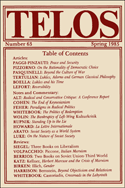 To presume that individual interests precede political action is not only to place the proverbial cart before the horse, it is to formulate a theory of social agency based on a belief in sequential phenomena sans justification for the particular sequence proposed. In “On the Rationality of Democratic Choice,” Alessandro Pizzorno argues that the system of political actions and interests is an annular one, which is why utilitarian and rational choice theories lack sufficient explanatory value. He proposes the goal of affirmation of socio-political identity is an alternative explanation of political action that does not speak the traditional language of costs and benefits, as that language is housed within a universalizing framework that doesn’t reflect reality. To presume that individual interests precede political action is not only to place the proverbial cart before the horse, it is to formulate a theory of social agency based on a belief in sequential phenomena sans justification for the particular sequence proposed. In “On the Rationality of Democratic Choice,” Alessandro Pizzorno argues that the system of political actions and interests is an annular one, which is why utilitarian and rational choice theories lack sufficient explanatory value. He proposes the goal of affirmation of socio-political identity is an alternative explanation of political action that does not speak the traditional language of costs and benefits, as that language is housed within a universalizing framework that doesn’t reflect reality.
Continue reading →
|
|
 With the publication of A Treatise Of Human Nature, David Hume turned the philosophical community of his time upside down with his provocative skepticism and denial of a cohesive self. Since its initial publication, Hume’s claim that the self is nothing but a bundle of perceptions has plagued philosophers and psychologists alike, and has inspired many to completely abandon the idea of a coherent self. Yet a central question remains largely unanswered: if there is not a self, what is doing the thinking, and how is it done? If a person does not have a “self,” how come human beings think of themselves as unique and separate entities that have subjective experiences? Lowell A. Dunlap’s article “Hume, James, and Husserl on the Self” investigates how William James and Edmund Husserl tackled the notion of personal identity in the aftermath of Hume’s philosophy.
With the publication of A Treatise Of Human Nature, David Hume turned the philosophical community of his time upside down with his provocative skepticism and denial of a cohesive self. Since its initial publication, Hume’s claim that the self is nothing but a bundle of perceptions has plagued philosophers and psychologists alike, and has inspired many to completely abandon the idea of a coherent self. Yet a central question remains largely unanswered: if there is not a self, what is doing the thinking, and how is it done? If a person does not have a “self,” how come human beings think of themselves as unique and separate entities that have subjective experiences? Lowell A. Dunlap’s article “Hume, James, and Husserl on the Self” investigates how William James and Edmund Husserl tackled the notion of personal identity in the aftermath of Hume’s philosophy.  In “The Crisis of the Left and New Social Identities” (1984), Federico Stame addresses the problems encountered by left-wing ideologies and political parties, such as the banality of their demands, as well as deeper underlying issues, such as the falling away of the friend-foe nexus in politics. He also provides hope for improvement by invoking the leading role of new social identities in renewing the tradition of the political Left.
In “The Crisis of the Left and New Social Identities” (1984), Federico Stame addresses the problems encountered by left-wing ideologies and political parties, such as the banality of their demands, as well as deeper underlying issues, such as the falling away of the friend-foe nexus in politics. He also provides hope for improvement by invoking the leading role of new social identities in renewing the tradition of the political Left.  Jürgen Habermas’s objective in “On Social Identity” is clearly defending the usage of instrumental rationality toward the development of a universal morality. For Habermas, the new social identity should be constructed through universalistic moral systems, thereby eliminating possible frictions or incoherence present in modern society. The obsolescence of the state and its replacement by autonomous means of identity construction, such as art, already point to his emphasis on a more particular form of identity construction.
Jürgen Habermas’s objective in “On Social Identity” is clearly defending the usage of instrumental rationality toward the development of a universal morality. For Habermas, the new social identity should be constructed through universalistic moral systems, thereby eliminating possible frictions or incoherence present in modern society. The obsolescence of the state and its replacement by autonomous means of identity construction, such as art, already point to his emphasis on a more particular form of identity construction.  Should national identity be considered to be an outdated concept in this day and age? Have the adjectives “French,” “Italian,” “German,” and so on become meaningless terms over the last couple of decades? Both practical and theoretical developments may seem to suggest that this question should be answered in the affirmative. Processes of globalization, including increased mobility and migration, have made it unmistakably clear that the human world cannot be divided into discrete social units. In addition, much philosophical effort has been devoted to destabilizing notions like “community,” “sameness,” and “identity.”
Should national identity be considered to be an outdated concept in this day and age? Have the adjectives “French,” “Italian,” “German,” and so on become meaningless terms over the last couple of decades? Both practical and theoretical developments may seem to suggest that this question should be answered in the affirmative. Processes of globalization, including increased mobility and migration, have made it unmistakably clear that the human world cannot be divided into discrete social units. In addition, much philosophical effort has been devoted to destabilizing notions like “community,” “sameness,” and “identity.”  To presume that individual interests precede political action is not only to place the proverbial cart before the horse, it is to formulate a theory of social agency based on a belief in sequential phenomena sans justification for the particular sequence proposed. In “On the Rationality of Democratic Choice,” Alessandro Pizzorno argues that the system of political actions and interests is an annular one, which is why utilitarian and rational choice theories lack sufficient explanatory value. He proposes the goal of affirmation of socio-political identity is an alternative explanation of political action that does not speak the traditional language of costs and benefits, as that language is housed within a universalizing framework that doesn’t reflect reality.
To presume that individual interests precede political action is not only to place the proverbial cart before the horse, it is to formulate a theory of social agency based on a belief in sequential phenomena sans justification for the particular sequence proposed. In “On the Rationality of Democratic Choice,” Alessandro Pizzorno argues that the system of political actions and interests is an annular one, which is why utilitarian and rational choice theories lack sufficient explanatory value. He proposes the goal of affirmation of socio-political identity is an alternative explanation of political action that does not speak the traditional language of costs and benefits, as that language is housed within a universalizing framework that doesn’t reflect reality. 

